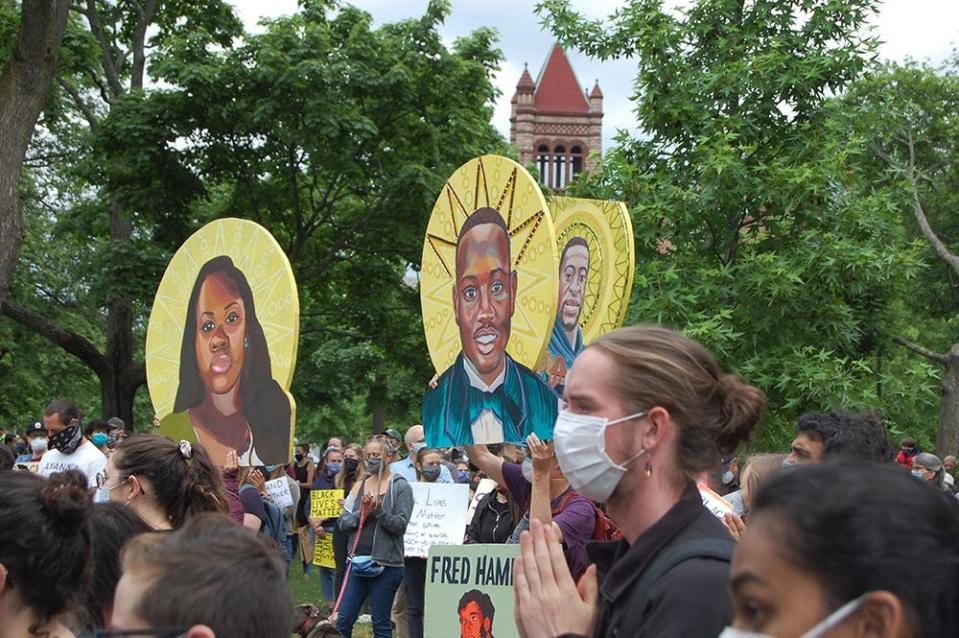'Chased down' and killed: Trial over Arbery's death reveals 'painful' similarity to case that launched BLM
- Oops!Something went wrong.Please try again later.
- Oops!Something went wrong.Please try again later.
- Oops!Something went wrong.Please try again later.
BRUNSWICK, Ga. – When protesters took to the streets last summer amid massive Black Lives Matter demonstrations, they often chanted three names: George Floyd, Breonna Taylor and Ahmaud Arbery.
The high-profile cases, and several police killings of Black Americans, sparked calls for justice. After a Kentucky grand jury declined to charge three cops for fatally shooting Taylor, the nation watched as former Minneapolis police officer Derek Chauvin was convicted of murder in Floyd's death.
Now, the murder trial of father and son Greg and Travis McMichael and William "Roddie" Bryan, the white men charged with killing Arbery, is underway. Their attorneys said the men suspected Arbery of burglary, tried to detain him for police and shot him in self-defense.
It's the next major case in the racial reckoning of the criminal justice system, but there are major differences in the legal issues at play.
The Georgia case bears more similarity to a killing nearly 10 years ago that helped launched the Black Lives Matter movement: the death of Trayvon Martin.
In 2012, neighborhood watch volunteer George Zimmerman called 911 to report a "suspicious person" in his Florida neighborhood. Moments later, Martin, 17, was fatally shot. Zimmerman was charged with second-degree murder and acquitted.
Ben Crump, a nationally known civil rights attorney representing Arbery's father, commented that the cases have "eerie similarities."
"Both men were literally chased down by men who will hold themselves out as quasi-law enforcement. But that's not the most important comparison," said Randy Reep, a criminal defense attorney based in Jacksonville, Florida. "The McMichaels and Bryan will now try to rely on self defense ... which is exactly the situation that happened with the Zimmerman case."
More: Rittenhouse case, Arbery death trial reflect deepening political and racial divides

'A painful comparison' between the death of Martin and Arbery
Defense lawyers contend the McMichaels tried to make a citizen's arrest because they believed Arbery was responsible for neighborhood break-ins and was trying to flee.
Georgia allowed citizens to detain someone they reasonably suspected of committing a felony in their presence. Gov. Brian Kemp repealed the law in May.
Prosecutors said that surveillance video shows Arbery was not committing a crime when he entered a property under construction the day he was ambushed and that the defendants had no evidence he did anything illegal.
In Martin's death, Zimmerman did not say he was making a citizen's arrest, but he expressed concern about recent break-ins when he called police and before he followed, shot and killed the teenager. Zimmerman was part of a neighborhood watch program and had a habit of calling police about criminal activities in the area, according to an FBI report.
"Much like Trayvon Martin was followed, Mr. Arbery was followed," Reep said. "Both were faced with a point where they had to decide the most basic of human instincts, which is flight or fight. ... There is a painful comparison."
Unlike the Zimmerman case, there is video showing the moments leading up to Arbery's death. The video, recorded by Bryan, wasn't released until two months after the killing, when the McMichaels and Bryan were arrested. Zimmerman wasn't charged and taken into custody until weeks after the shooting.
Some of the altercation between Zimmerman and Martin can be heard on 911 calls, but conflicting witness accounts made it difficult to determine how the confrontation unfolded.
Although some crucial moments are obscured in the cellphone video of Arbery's death recorded by Bryan, there is "less room for doubt about exactly what happened leading up to the death" than in the Zimmerman case, said Tim Floyd, a criminal law professor at Mercer University in Atlanta.
"There were no other versions of what happened that night, except for George Zimmerman's statement, which is really the only direct evidence the jury had to go on," Floyd said.
Ahmaud Arbery video: Legal experts break down how key frames may be used in murder trial
Race played a role in both cases
Florida state attorneys argued during the trial that Zimmerman, who is Hispanic, wrongly profiled Martin as a criminal. Zimmerman maintained that race was not a factor in his actions.
"In the Zimmerman case, it was implicit that it was race-based," Reep said. "I’m not sure, frankly, the evidence bore that out."

Attorneys for the McMichaels and Bryan said the case is not about race, but lead prosecutor Linda Dunikoski argued that the three defendants made assumptions when they saw a Black man running in their neighborhood.
The trial has been dominated by race from the beginning of jury selection.
Judge Timothy Walmsley acknowledged there appeared to be "intentional discrimination" in the jury selection process, as only one Black man was selected for the 15-member panel.
Crump, who represents Arbery's dad, Marcus, said Wednesday outside the courthouse that it's concerning the jury doesn’t reflect the diversity of the county, which is 26% Black. Brunswick, where Arbery was shot and where the trial is being held, is more than 55% Black, according the U.S. Census Bureau.
In the Zimmerman trial, there were six jurors and four alternates, one of whom identified as Black with Mestizo ancestry. At the time, 10% of Seminole County's population was Black.
Opening arguments: Predominantly white jury seated in murder trial over Ahmaud Arbery's death
Though jurors are told to follow evidence and the law as instructed by the court, Crump said they are told they can use their life experiences and perspectives.
“When they do that, do they understand the life experiences of Ahmaud? His background? HIs culture?” Crump asked. “Or will they be more akin to the perspective and background of the killers of Ahmaud Arbery?"
Scholars, courts and legal groups have advocated for more diverse juries as a way to make trials fairer. A study in 2006 based on mock trials found that all-white juries are more prone to convict Black defendants, but white jurors became more thorough, conscientious and willing to discuss the relevance of race to a case when people of color were included.
Walmsley ruled prosecutors can show the jury a photo of the McMichaels' truck, which had a vanity plate of Georgia’s old state flag with the Confederate battle emblem, which some prospective jurors considered a racist symbol.
Reep said the jury may learn that Bryan told authorities he heard Travis McMichael utter a racist slur after the shooting, which McMichaels' attorneys denied.
Those details could support the claim that the defendants were motivated by racial animus, but Dunikoski said the state doesn't plan to present that kind of evidence unless the defense "opens the door" on the issue of motive.
Floyd said prosecutors don't need to prove the men targeted Arbery because of his race because the McMichaels and Bryan don't face state hate crime charges. Georgia did not have hate crime legislation until after Arbery's death.
"But, of course, race was a factor in many people's minds," Floyd said. "Jurors might very well believe that his race was part of the reason that they decided to go after him."
A 'lynching' or self-defense? 3 Georgia men go on trial in the 2020 murder of Ahmaud Arbery
'There is still racism in the world': Race at forefront of jury questioning in trial over Ahmaud Arbery's death

The strategy of self-defense
The strategy used by defense attorneys is the same one that resulted in Zimmerman being found not guilty of second-degree murder: self-defense.
Although the case brought intense scrutiny on "stand-your-ground" laws, Mark O'Mara, Zimmerman's lawyer, told USA TODAY in 2018 he didn't use that provision in his argument.
"Stand your ground only applies if you have the opportunity to flee," he said. "Zimmerman was on his back. It was strictly self-defense."
In Florida and Georgia, self-defense does not apply if the person who committed the homicide was the "initial aggressor," meaning he created the dangerous situation, Floyd said.
Floyd said Judge Debra Nelson did not make this clear in her final instructions to the jury that found Zimmerman not guilty.
"Had the jury been told that – which was Florida law – the jury might very well have come out the other way because they could easily have found he provoked the whole thing," Floyd said.
Legal experts were not surprised by the verdict, saying the prosecution did a poor job proving its case while the defense was able to humanize Zimmerman and create reasonable doubt.
Floyd cautioned against making predictions about a verdict in Arbery's death based on a nearly 10-year-old case from another state.
"Every case is different," he said.
'It's a small enough town': Privacy complicates jury selection in trial over Ahmaud Arbery's death
Contributing: John Bacon and Yamiche Alcindor, USA TODAY; Raisa Habersham, The Savannah Morning News; The Associated Press
This article originally appeared on USA TODAY: Ahmaud Arbery death trial reveals similarities to Trayvon Martin case

